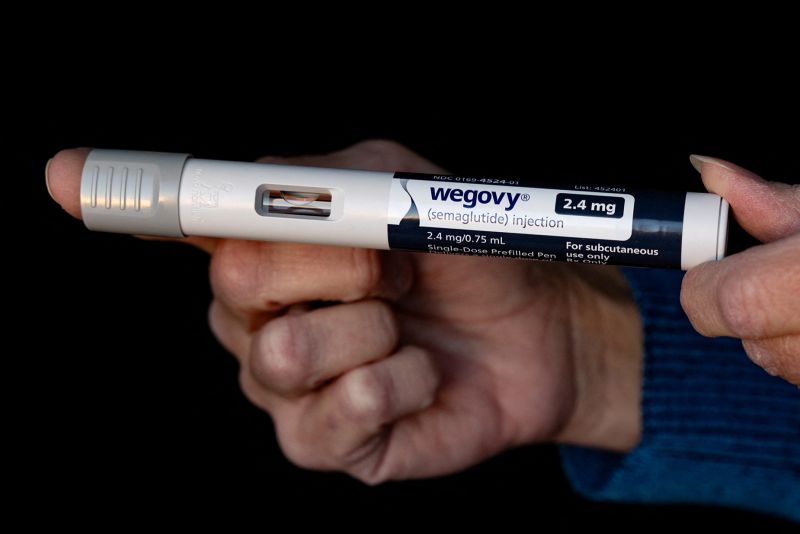
Link Between Common Drugs for Weight Loss and Diabetes and Stomach Paralysis Uncovered in Recent Studies

Recent studies reveal a concerning association between widely used medications for weight loss and diabetes and the development of stomach paralysis. Real-world data highlights the increased risk of this rare yet serious side effect, shedding light on the potential dangers of these drugs.
Injected medications used to treat diabetes and obesity have been found to potentially increase the risk of a rare but serious side effect known as stomach paralysis, according to recent data from studies on the real-world use of these drugs.
Several new studies, each based on extensive patient records, have revealed that individuals taking GLP-1 agonists may have a higher likelihood of developing stomach paralysis, also known as gastroparesis, compared to those not taking these medications.
The injectable drug Ozempic is shown Saturday, Dec. 30, 2023, in Houston. (AP Photo/David J. Phillip)
The injectable drug Ozempic is shown Saturday, Dec. 30, 2023, in Houston. (AP Photo/David J. Phillip)
David J. Phillip/AP
Related article
1 in 8 adults in the US has taken Ozempic or another GLP-1 drug, according to a survey by KFF.
The studies presented at the medical conference Digestive Disease Week 2024 in Washington have not been reviewed by outside experts or published in medical journals, so the data is considered preliminary. Two studies were presented on Saturday, with the third scheduled for Monday.
GLP-1 agonists are highly sought after because of their effectiveness in promoting weight loss. Medications like Wegovy and Zepbound have been shown in clinical trials to help individuals shed at least 10% of their initial weight. Recent studies have highlighted their positive impact not only on weight but also on heart health. In fact, drug manufacturer Novo Nordisk revealed that 25,000 Americans are starting Wegovy treatment every week.
These medications work by reducing appetite through slowing down the digestion process in the stomach. Additionally, they stimulate the body to produce more insulin and send signals to the brain to decrease cravings.
Some people may experience unpleasant to severe bouts of vomiting as a side effect of certain medications, which may need medical attention. These medications can also slow down the stomach, leading to a condition known as gastroparesis.
According to doctors, gastroparesis usually improves once the medication is discontinued. However, some individuals have reported that their symptoms did not improve even months after stopping the medication, causing significant disruptions to their daily lives.
Measuring the risk of gastroparesis
Recent studies show that the likelihood of developing gastroparesis is rare but consistent. People who took GLP-1 medications had a 50% higher risk of being diagnosed with the condition compared to those who did not.
One study conducted by researchers at University Hospitals in Cleveland utilized data from the TriNetX database, which contains millions of patient records from 80 healthcare organizations. The research specifically looked at adults who were obese, with a body mass index over 30, but did not have diabetes, gastroparesis, or pancreatitis at least six months before starting a GLP-1 medication. The study included records from over 286,000 patients.
Emily Wright
Emily Wright
Courtesy Emily Wright
Related article
They took blockbuster drugs for weight loss and diabetes. Now their stomachs are paralyzed
Diabetes can increase the risk of gastroparesis, especially if blood sugar levels are poorly controlled over time.
Among individuals prescribed a GLP-1 medication for weight loss, like semaglutide (Ozempic, Wegovy), exenatide (Byetta), and liraglutide (Victoza), 0.1% were diagnosed with gastroparesis at least six months later. In comparison, only 0.04% of individuals not taking a GLP-1 medication, but matched based on age, sex, ethnicity, and other factors, developed the condition.
The difference in risk of being diagnosed with stomach paralysis while on a GLP-1 medication was found to be 52%, a statistically significant increase.
A second study conducted by researchers at the University of Kansas analyzed data from the TriNetX research network database. The study focused on patients who were prescribed GLP-1 medications for diabetes or obesity between December 2021 and November 2022. They were compared with individuals who had diabetes or obesity and had visited a doctor during the same period but were not prescribed a GLP-1 medication. The study included records from nearly 300,000 patients.
People taking GLP-1 medications were found to be 66% more likely to be diagnosed with gastroparesis compared to those not taking these medications. In fact, about 0.53% of patients on GLP-1 drugs were diagnosed with stomach paralysis, which means roughly 1 out of every 200 people taking these medications experienced gastroparesis.
In addition to gastroparesis, individuals taking GLP-1 medications were also more likely to experience symptoms such as nausea, vomiting, and gastroesophageal reflux disease (GERD). They were also more likely to be prescribed proton pump inhibitors. Moreover, they had a higher likelihood of undergoing gallbladder removal and facing drug-induced pancreatitis.
Rebekah Carl poses with her prescription of Wegovy in New Columbia, Pennsylvania, U.S., November 13, 2023. Photo taken on November 13, 2023. REUTERS/Hannah Beier
Rebekah Carl poses with her prescription of Wegovy in New Columbia, Pennsylvania, U.S., November 13, 2023. Photo taken on November 13, 2023. REUTERS/Hannah Beier
Hannah Beier/Reuters
Related article
The results of Wegovy’s longest clinical trial reveal important information about weight loss, side effects, and heart protection. According to study author Dr. Prateek Sharma, a professor at the University of Kansas School of Medicine, while these drugs are effective when used for the right reasons, there is a 30 percent chance of experiencing gastrointestinal side effects if you choose to start this treatment. It is important to be aware of this potential risk as it may lead to the discontinuation of the drug.
Some side effects of medications may decrease as individuals become accustomed to their doses. Doctors typically begin with a low dose and gradually increase it over time to help minimize side effects.
Sharma pointed out that the study involved individuals with diabetes in both the group using GLP-1 medications and the comparison group. Despite this, they observed a higher occurrence of stomach paralysis in those taking the medications, indicating that diabetes alone was not the sole factor contributing to the elevated risk.
He mentioned that the only difference between the two groups was the drug they were taking.
Sharma, who will soon be the president of the American Society of Gastrointestinal Endoscopy, pointed out that GI side effects such as nausea, vomiting, and gastroparesis were much more common in the group taking GLP-1 compared to the control group.
It is possible that an adverse event was overlooked in clinical trials. Even though the drugs were thoroughly examined, Sharma believes that gastroparesis might be rare enough to not have been detected in the trials due to a limited number of patients being included.
“You need hundreds of thousands of patients to come up with these conclusions, but that’s why I think these database studies are much more important there,” Sharma said.
The injectable drug Ozempic is shown Saturday, Dec. 30, 2023, in Houston. (AP Photo/David J. Phillip)
The injectable drug Ozempic is shown Saturday, Dec. 30, 2023, in Houston. (AP Photo/David J. Phillip)
David J. Phillip/AP
video
Related video
Surprise pregnancies have been reported by women who were taking weight loss drugs. Dr. Michael Camilleri, a gastroenterologist and researcher at the Mayo Clinic, suggests that this may have been missed in clinical trials due to the way researchers typically test for it. Dr. Camilleri has studied gastroparesis with the GLP-1 drug liraglutide.
When studying gastric emptying, it is crucial to focus on the emptying of solids rather than liquids, according to Camilleri. Solids take longer to pass through the stomach compared to liquids.
Pharmaceutical companies typically evaluate the impact of certain medications on gastric emptying by using a method that measures the emptying of liquids from the stomach, as noted by Camilleri.
The acetaminophen absorption test is a commonly used method because it is quicker and more cost-effective compared to a gastric emptying study with scintigraphy. The latter involves the use of a radioactive tracer to determine the amount of solid food remaining in the stomach hours after a meal.
Acetaminophen is absorbed through the stomach and enters the bloodstream through liquids. Monitoring how rapidly acetaminophen appears in the blood can provide insight into the speed at which liquids are moving through the stomach, but not solids. However, experts like Camilleri caution that acetaminophen absorption is not a sufficient test for gastroparesis in individuals taking GLP-1 medications.
Camilleri was part of a team that presented a study at Digestive Disease Week examining the effects of GLP-1 medications on gastroparesis.
The study analyzed data from around 80,000 patients who were prescribed GLP-1 medications within the Mayo Clinic’s health system. The researchers specifically looked at 839 individuals who showed symptoms of gastroparesis and underwent a diagnostic test called gastric emptying scintigraphy.
About one-third of that group, 241 people, had food in their stomach four hours after eating a test meal, which means they qualified as having gastroparesis.
Get CNN Health's weekly newsletter
Sign up here to receive The Results Are In with Dr. Sanjay Gupta every Tuesday from the CNN Health team.
Nevertheless, the research did not compare the likelihood of developing gastroparesis among individuals taking the medications versus those who were not.
Camilleri mentioned that the risk of gastroparesis may be underestimated in studies because not everyone with symptoms would have received the necessary diagnostic test.
In the Mayo Clinic study, it was found that women and individuals who experienced constipation while taking GLP-1 medications were more likely to be diagnosed with gastroparesis.
Camilleri mentioned that constipation could be a sign that someone may experience difficulties with gastroparesis while on a GLP-1 medication. However, there are still many unanswered questions.
He emphasized that for those who develop this complication, it is a very serious matter.
Editor's P/S:
The recent findings on the potential risk of stomach paralysis associated with injectable medications for diabetes and obesity raise concerns about the safety of these drugs. The studies suggest that individuals taking GLP-1 agonists may face a higher likelihood of developing gastroparesis, a condition that slows down stomach emptying and can lead to severe symptoms. While the risk is considered rare, the consistency of the findings across multiple studies warrants further investigation.
It is crucial for healthcare providers and patients to be aware of this potential side effect and weigh the benefits and risks of these medications carefully. The development of gastroparesis can significantly impact an individual's quality of life, and it is important to have open and informed discussions about the potential consequences before starting treatment. Further research is needed to fully understand the long-term effects of GLP-1 agonists and to identify potential mitigating strategies to minimize the risk of gastroparesis.









